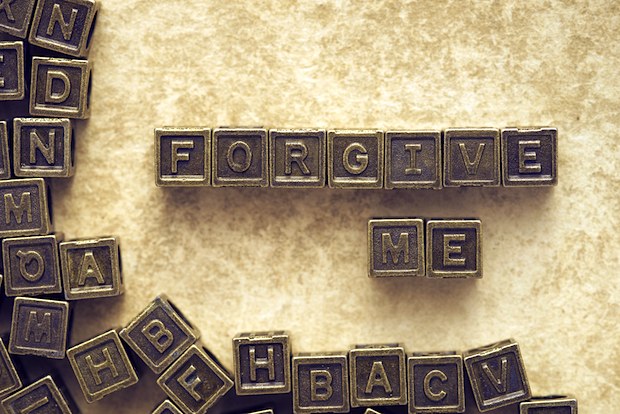Who is the hardest person to forgive? An abusive parent? A partner who betrayed you? One who shattered our world with mass violence? Well, according to Google, based on the volume of responses to this question, the answer is: yourself.
But is that true?
I’m not challenging the accuracy of the claim that self-forgiveness is the hardest to practice. Far be it from me to challenge Google’s all-knowing, all-powerful algorithms, and their power to shape our lives! Well, perhaps I should (at least the latter) but that is for another time. For now, I’m just wondering why the notion of self-forgiveness, as popular as it is, seems to be so difficult. I have two theories.
Theory one goes something like this: People go on and on about self-forgiveness being so hard, and so important and so everything else, because it helps them avoid the tough work of forgiving others – or the often even tougher work of seeking forgiveness. At its worst, obsessing about self-forgiveness is well-packaged New-Age narcissism, which helps us feel noble and enlightened for worrying mostly about ourselves. And I do think that’s a part of what fuels the popular fascination with self-forgiveness (part).
Who we have been is a part of who we are, but no more so than the person we are becoming.
And that’s where theory two comes in, based on the fact that no matter what, there’s only one you. Each of us is unique and infinitely complex. The process of making sense of our lives, filling our days with meaning, purpose and love is ultimately a task – and a blessing – that’s ours alone. Others can and must help, just as we can and must help others. But we each have to run our own race because we really are unique; nobody can run that race for us (make that journey, row that boat or whatever other metaphor works best for you). And that’s why it’s both genuinely so hard, and so fundamentally important, to forgive ourselves.
It’s hard, because when we forgive ourselves we’re actually letting go of a piece of what makes us uniquely ourselves. And even if that piece we are forgiving/letting go is not a “good” piece, that kind of change can be as scary and destabilizing as it is beneficial.
Of course – and here’s the hopeful part – forgiving/letting go will also reveal a new part of what makes us uniquely ourselves. So we have something to forward to: experiencing more of who we are/have always been/are meant to become.
It’s much more than a narcissistic dodge to acknowledge that the hardest person to forgive is yourself. It’s about appreciating that we’re all works in progress. It’s realizing that, not having been the person we may have wanted to be in the past (however painful that may be now) doesn’t mean that’s who we “really are” and so we can’t get past it or forgive ourselves for it.
Who we have been is a part of “who we are,” but no more so than the person we are becoming, the person we are evolving into, when we practice self-forgiveness.
We are our past, our present and our future selves.
We are our “best” selves and our “worst” selves.
We are – to offer what I hope is a helpful metaphor – the paints on the pallet and the artist who will use them, more than we’re any one particular painting.
Self-forgiveness is simply the practice of taking up the brush, and knowing that we have the ability to paint again, however we may feel about our past work.

Listed for many years in Newsweek as one of America’s “50 Most Influential Rabbis” and recognized as one of our nation’s leading “Preachers and Teachers,” by Beliefnet.com, Rabbi Brad Hirschfield serves as the President of Clal–The National Jewish Center for Learning and Leadership, a training institute, think tank, and resource center nurturing religious and intellectual pluralism within the Jewish community, and the wider world, preparing people to meet the biggest challenges we face in our increasingly polarized world.
An ordained Orthodox rabbi who studied for his PhD and taught at The Jewish Theological Seminary, he has also taught the University of Pennsylvania, where he directs an ongoing seminar, and American Jewish University. Rabbi Brad regularly teaches and consults for the US Army and United States Department of Defense, religious organizations — Jewish and Christian — including United Seminary (Methodist), Yeshivat Chovevei Torah (Modern Orthodox) Luther Seminary (Lutheran), and The Jewish Theological Seminary (Conservative) — civic organizations including No Labels, Odyssey Impact, and The Aspen Institute, numerous Jewish Federations, and a variety of communal and family foundations.
Hirschfield is the author and editor of numerous books, including You Don’t Have To Be Wrong For Me To Be Right: Finding Faith Without Fanaticism, writes a column for Religion News Service, and appears regularly on TV and radio in outlets ranging from The Washington Post to Fox News Channel. He is also the founder of the Stand and See Fellowship, which brings hundreds of Christian religious leaders to Israel, preparing them to address the increasing polarization around Middle East issues — and really all currently polarizing issues at home and abroad — with six words, “It’s more complicated than we know.”

